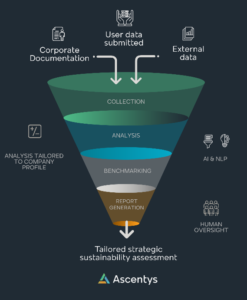ESG Model Validation
Ascentys operates in the ESG (Environmental, Social and Governance) space.
We have defined a model of 360 KPIs across each aspect of ESG and use technology to systematically extract the relevant data from customers documents. We then use the data to inform and calculate each KPI.
As a result, we are able to automate ESG assessments, finally making it possible for companies of all sizes to measure their ESG performance in a way that is easy, cost-effective and accurate.
For more information see also the Introduction to Ascentys V4 (short).
Context:
Until recently, a company’s performance was measured primarily by how well it does financially. Over the past decades, stakeholders (shareholders, employees, customers, regulators etc.) have pushed for a more holistic approach to determine how well a company performs.
This approach has grown into what is now commonly referred to as ESG (Environmental, Social and Governance). ESG considers how well a company is run, its role and impact on the Environment and Society.
 Idea: We are building a tool to automatically assess the ESG (Environmental, Social and Governance) performance of companies. We ingest data and documents (HR files, Policies, corporate presentation, etc.) from customers and using AI we extract ESG-relevant information. We then feed that information to our model of 360 ESG KPIs (120 for each of the Environmental, Social and Governance domains) The model will process this data and produce an assessment with a rank, a score for each KPI.
Idea: We are building a tool to automatically assess the ESG (Environmental, Social and Governance) performance of companies. We ingest data and documents (HR files, Policies, corporate presentation, etc.) from customers and using AI we extract ESG-relevant information. We then feed that information to our model of 360 ESG KPIs (120 for each of the Environmental, Social and Governance domains) The model will process this data and produce an assessment with a rank, a score for each KPI.
Challenge:
Since we are assessing companies across such a broad scope, we want to make sure that
we carry out this assessment in a way which:
– is ethical and free of bias
– is fair and adequate in company assessment and rating
– includes the latest thinking and best practices from academia
Requested Support:
We are looking for research partners in academia to review, validate, examine, and expand
the KPIs, as well as the method used to assess and rate each KPI, especially in the following
areas:
– “Diversity, Equity & Inclusion”. E.g., support from someone involved in social studies
in the workplace regarding topics such as gender equality, disability, and inclusion.
– “Environmental Impact”, especially about carbon footprint measurement, considering
relatively new topics such as impact of Working from Home or measuring indirect
emissions (Scope 2 & 3).
– “Tax Transparency”, especially to devise a formula to assess a company’s potential
lack of tax transparency or on the other hand, potential excess of “Tax optimization”.
